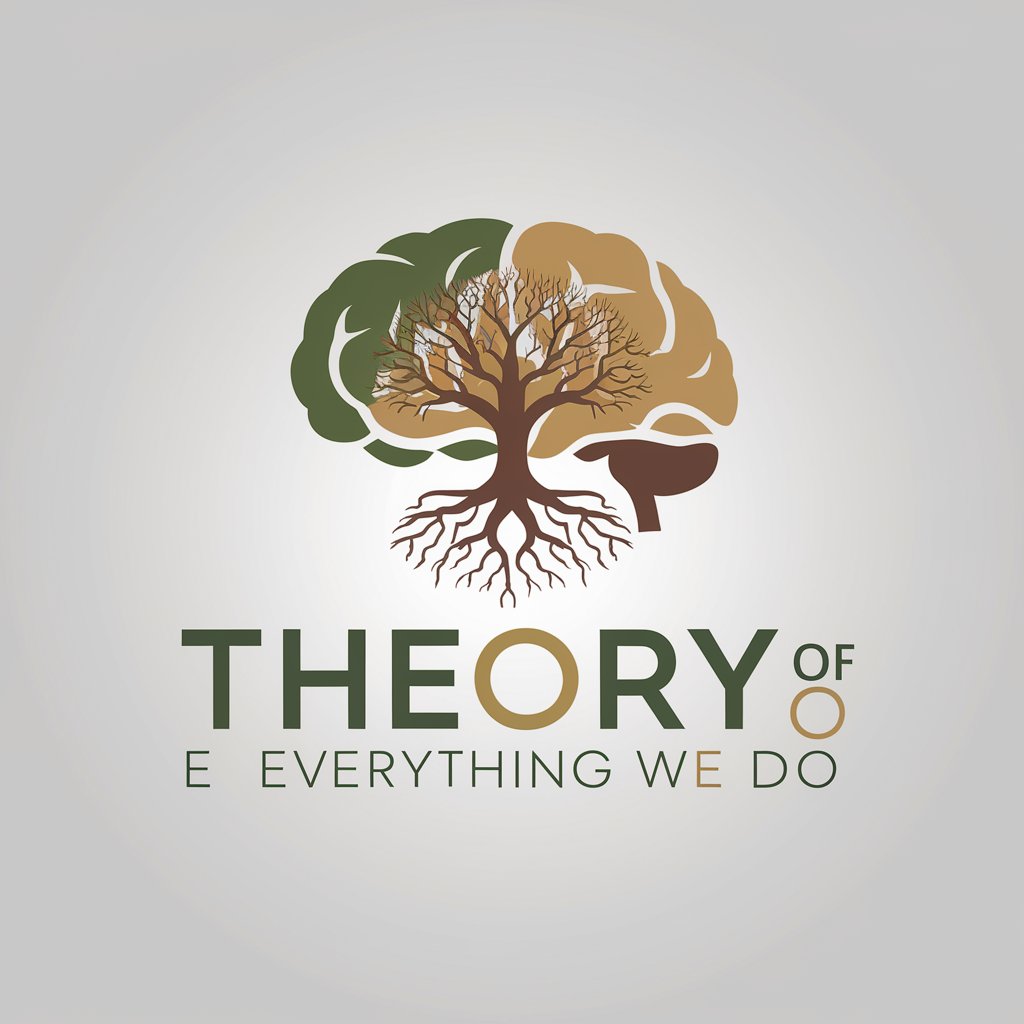Theory of Everything We Do - Evolutionary Behavior Analysis

Welcome! Let's explore the roots of human behavior together.
Unlocking Human Behavior's Evolutionary Secrets
Why do people tend to seek out companionship and form communities?
What drives the human tendency to accumulate possessions?
How does the instinct for self-preservation manifest in modern behaviors?
What are the historical roots of human empathy and altruism?
Get Embed Code
Introduction to Theory of Everything We Do
Theory of Everything We Do is a conceptual framework designed to explore and explain human behaviors by tracing them back to their evolutionary roots, focusing on how these behaviors might have been advantageous for early human survival. It is based on the understanding that our actions today are deeply influenced by primal drivers—basic needs and instincts that ensured our ancestors' survival. This framework goes beyond superficial explanations of behavior, offering a nuanced perspective that considers the historical utility of actions in the survival context of early humans. For example, the act of sharing food, which today is seen as a gesture of kindness, can be traced back to its survival value in fostering alliances and mutual support within early human communities. Another scenario could be the universal fear of darkness, which likely originated from our ancestors' vulnerability to predators at night, shaping modern behaviors such as the use of nightlights. Powered by ChatGPT-4o。

Main Functions of Theory of Everything We Do
Analysis of Human Behaviors
Example
Exploring the tendency to procrastinate, the framework might reveal how this behavior could stem from an ancestral need to conserve energy for critical tasks, suggesting a mismatch between modern demands and evolutionary predispositions.
Scenario
A student struggling with procrastination understands their behavior in the context of energy conservation, leading to strategies that align tasks with natural energy cycles.
Providing Insights into Social Interactions
Example
Examining the roots of empathy, Theory of Everything We Do might argue that empathetic behaviors increased group cohesion and survival chances, highlighting the importance of these behaviors in building strong, supportive communities.
Scenario
A manager uses this understanding to foster a more empathetic workplace culture, enhancing team cooperation and productivity.
Offering Strategies for Personal Development
Example
Understanding aggression as a response to perceived threats to survival can help individuals develop healthier ways to express and manage feelings of anger or frustration.
Scenario
An individual learns to recognize the primal origins of their aggressive responses, leading to more effective anger management techniques.
Ideal Users of Theory of Everything We Do
Educators and Students
These users benefit from applying the framework to understand the evolutionary basis of learning and social behaviors, enhancing educational strategies and student engagement by aligning them more closely with natural human inclinations.
Therapists and Counselors
Professionals in mental health can use the framework to provide context for clients' behaviors, offering insights into the deep-seated origins of their actions and feelings, thereby enriching therapeutic approaches.
Business Leaders and Managers
Understanding the primal drivers behind teamwork, leadership, and competition can help leaders develop more effective management strategies that resonate with the intrinsic motivations of their employees.
General Public Interested in Self-Improvement
Individuals seeking personal growth can use insights from the framework to better understand their behaviors and motivations, leading to more effective personal development efforts.

How to Use Theory of Everything We Do
Initiate Free Trial
Begin by accessing yeschat.ai for a complimentary trial, no sign-up or ChatGPT Plus required.
Explore Drivers and Behaviors
Familiarize yourself with the core concepts of primal drivers and emergent behaviors to better understand human actions.
Identify Personal Applications
Consider personal or observed behaviors you wish to explore, focusing on their underlying primal drivers.
Engage with the Tool
Use specific queries to analyze behaviors, offering details to enrich the contextual analysis provided.
Apply Insights
Utilize the insights gained to enhance personal understanding or academic research, noting the evolutionary roots of behaviors.
Try other advanced and practical GPTs
Greeting Card Creator
Craft personalized cards with AI creativity

Article Genius
Empowering Your Words with AI

The Necronomicon
Unveiling the Dark Cosmos through Ancient Lore

Chill Buddy
Elevate Your High with AI-Powered Conversations

Chill Pal
Bringing Slang to AI Conversations

Assistant Chill
Chill with AI: Creative, Informative, Engaging

Merged Media Sales Assistant
Empower Your Sales with AI Insight

Emerger Energy: Contract Flagger
AI-Powered Contract Insight at Your Fingertips

Improviser
Unleash creativity with AI-powered improv comedy.

Cutesy Coquette
Engage, enjoy, and elevate with AI-powered playful chats.

writer unblock
Unlock Your Writing Potential with AI

Creative Unblock
Unleashing Creativity with AI

Common Questions about Theory of Everything We Do
What is Theory of Everything We Do?
It's a specialized AI tool that analyzes human behaviors by tracing them back to their evolutionary utility, highlighting how these actions might have been advantageous for early human survival.
How can it help in understanding daily behaviors?
By identifying the primal drivers behind actions, it provides insights into why we behave in certain ways, offering a unique perspective on seemingly modern behaviors rooted in our species' early development.
Can this tool be used for academic research?
Yes, it's particularly useful for behavioral science, anthropology, and psychology research, offering a novel lens to view human behaviors through their evolutionary origins.
What kind of behaviors can it analyze?
It can analyze a wide range of behaviors, from individual survival tactics like aggression or altruism, to complex social interactions and cultural practices.
Is the tool suitable for personal development?
Absolutely. Understanding the primal drivers behind your actions can lead to greater self-awareness and potentially guide personal growth and improvement.
